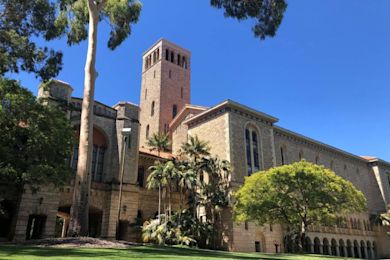Topics covered
- Published: 6 January 2025
- Updated: 5 January 2025
Why should you send your child to study abroad in high school? Studying abroad in high school is an important decision when students still need attention and guidance from their families or guardians. The age of high school is the age when students are developing and absorbing new things faster. Therefore, studying abroad in high school will be a solid stepping stone, helping students get acquainted with the international learning environment, train their confidence, and be ready to enter the university program.
So which country should you study abroad? Let's find out more about the conditions and how to choose a high school study abroad school with IDP in this article!
1. Should I go to high school?
Studying abroad in high school is increasingly popular because of the growth opportunities and long-term benefits it brings. Studying abroad in high school is a great opportunity for students to enroll in prestigious universities around the world. At this age, students are able to integrate into a new environment faster, improve their English skills, and build strong confidence for the journey of adulthood
Not only learning, students also have the opportunity to practice important soft skills such as financial management and problem-solving skills in a multicultural environment. These are the benefits that studying abroad early in high school brings, making a significant difference in the development of each student.
Studying abroad in high school is an opportunity to enroll in prestigious universities around the world.
In addition, studying abroad also broadens students' perspectives on the world, making it easier for them to integrate and connect with international friends. Moreover, the decision to study abroad in Hamlet 3 also opens up opportunities to settle down in the future.
Join the IDP student community
Connect with peers and student ambassadors to hear real experiences, tips, and advice about studying abroad.

2. Conditions for studying abroad in highschool
Depending on each school, there will be different requirements for academic ability and conduct. Most schools will rely on the average score to assess the level and attitude of international students. In addition, some schools will also require English language proficiency, to ensure that students keep up with the curriculum and quickly integrate into the new environment. Schools usually require you to possess a TOEFL or IELTS certificate, but the entrance score will vary depending on the school and region.
For students under 18 years old, when studying abroad in high school, a guardian is required. Guardians can be accompanying relatives, relatives living in that country, or school-accepted homeowners. The guardian must prove financial eligibility to live within the first 12 months.
3. How to choose a high school
Choosing a school when studying abroad in high school can be a challenge if parents don't know where to start. To make the search easier, parents should clearly define important criteria to narrow down the search.
Parents can answer questions such as: What is the language of instruction? Is the tuition fee suitable for the budget? Do you want to study in a big city or a quieter area? Is the climate there suitable? Which country is famous for the topic of learning your child is interested in?
Parents should clearly define important criteria to narrow down the search for schools
Once the location has been identified, the next step is to learn about the subject your child wants to pursue. This is an important factor affecting the choice of school. To make the right decision, parents should consider: Which areas are your child's strengths? What is your child really passionate about? And will this major have prospects in the labor market in the future?
4. Where to study abroad in high school
Choosing a country to study abroad in high school is an important decision for both students and parents. Because, the culture and lifestyle in that country will affect the development journey and study abroad experience of students. Here are the popular high school study abroad countries that parents can consider choosing:
High School Study in Australia
Australia has affirmed its position as one of the top study abroad destinations preferred by Vietnamese parents and students. Not only does it stand out for its high-quality education system, studying abroad in Australia also offers fascinating cultural experiences and career development.
Secondary school system in Australia:
Public School:
Established and managed by state governments. Each state will have its own training program and clear regulations on qualifications according to a common Australian scale
Private School:
Established and managed by private organizations or individuals. Tuition fees at private schools are usually higher than at public schools.
Boarding Schools:
Private schools where students study and live in dormitories on campus.
Requirements for studying in high school in Australia:
The minimum grade point average (GPA) for the years is 6.5 or higher.
Face-to-face interviews in English or writing short essays.
English proficiency is equivalent to IELTS 5.0 – 5.5 – 6.0.
The tuition fee for studying abroad at high school in Australia is only from 12,000 to 18,000 AUD/year (equivalent to 200-300 million VND/year) for public relations.
High school study abroad in the US
The United States is famous for its advanced education system and diverse curriculum. With a high-quality high school system, studying abroad in the US attracts many international students every year.
High School System in the US:
Public Schools:
Funded by the government or the federal government, these schools offer affordable tuition and uniform quality.
Private Day Schools:
These are private schools where students study during the day and return home after school. Tuition is higher than in public schools, but the curriculum is often designed separately.
Boarding Schools:
Suitable for international students without a guardian in the U.S., these schools offer dormitories and a comprehensive learning environment. However, the cost will usually be higher than other schools.
Requirements for studying in the U.S. for high school:
School report score on a scale of 10 from 8.0 or higher with good behavior
SAT, GRE, or HSPT certificate
The SSAT test is from 1,900 to 2,200 points.
Letter of recommendation from a teacher at an old school in Vietnam.
Tuition fees for high school study abroad in the US:
Public schools: about 18,000 – 22,000 USD/year (equivalent to 430-520 million VND).
Semi-boarding private schools: ranging from 25,000 – 28,000 USD/year (about 590-660 million VND).
Boarding program: about 35,000 – 60,000 USD/year (the cost includes tuition fees and living expenses at the school).
See more:
Choosing a country to study abroad in high school is an important decision for both students and parents
High School Study in Canada
Canada is also an ideal destination for high school students, with a learning environment that focuses on comprehensive development. Studying abroad in high school in Canada, students not only learn knowledge but also participate in many extracurricular activities to practice life skills.
High School System in Canada:
Public Schools:
Managed by the government or provinces. These schools ensure the quality of teaching and often arrange accommodation with host families for international students.
Private schools:
Managed by private institutions, with small class sizes (10-15 students). These schools have their own curriculum but must still be approved by the province. Students attending the school can choose to live in a dormitory or with a host family.
Requirements to study in Canada in high school:
Achieving an average score of 6.5 or higher in all subjects in the last 2 years.
Take a Math and English education test to conduct classification and placement.
The tuition fee for the high school program is considered not too high:
The average tuition fee is between CAD 10,000 and CAD 15,000 in an academic year.
Fees at private schools will be higher from 15,000 to 17,000 CAD/year.
The cost of living will usually range from about 8,000 to 12,000 CAD/year.
See more:
Studying abroad in high school in the UK
Studying abroad at high school in the UK is not only a solid stepping stone to enter prestigious universities, but also provides the opportunity to experience an advanced education system, different from many countries in the world.
Secondary education in the UK is divided into four main categories:
International Baccalaureate (IB):
The program requires students to study a variety of subjects, suitable for students who are quite good academically and have completed at least 2 years of high school.
A-level: Ideal
for students with good academic ability or higher, especially those who are aiming for difficult subjects such as medicine, law, or natural sciences. This program focuses on 3-4 intensive subjects, equivalent to the first year of university.
Foundation (International Foundation):
This is a short-term program for students who are late transitioning students (usually after completing Year 11) but still want to study at top universities in the UK.
GCSEs or iGCSEs (Grade 10 preparation program):
This is a foundation program for students who have completed grade 8 or 9 in Vietnam and achieved an IELTS level of 4.5 or higher. This program will last 2 years (6 semesters), allowing students to choose subjects that suit their interests and aptitudes, from arts and languages to natural sciences or social sciences. Upon completion, students often go on to study the IB or A-level program in preparation for university.
Secondary school system in the UK:
Independent Boarding School:
The school is funded and managed by the government, but admission usually requires a nomination from the local government or government agencies.
Public Day School:
The school is managed by local education or the government. The tuition fees of these schools are quite affordable, and suitable for Vietnamese international students.
Vocational Training and International Foundation:
In addition to A-level and Foundation programs, these schools also offer career orientation or pathway courses to higher education at a lower cost than semi-boarding public schools.
Conditions for studying high school in the UK:
An offer letter from a licensed sponsor in the UK.
English language proficiency corresponds to level B1 or B2 according to the Common European Framework of Reference for Languages (CEFR), depending on the course level.
Proof of sufficient financial means to cover the cost of studying and living in the UK, with GBP1,483/month in London and GBP1,136/month outside London.
Tuition fees for studying in the UK at level 3:
Tuition fees range from GBP 30,000 to GBP 45,000 per year, depending on the type of school and program of study.
The cost of living is around GBP 10,224–13,347 per year, depending on the city of study.
Studying abroad in high school not only helps you broaden your horizons and access to cutting-edge education, but it is also an opportunity to experience culture and develop yourself. If parents are confused about which country to choose for their child, contact the IDP 19006955 hotline for advice.
IDP is always ready to listen and accompany you to help you choose the right country to study in high school according to your finances, orientation, and interests. Throughout your study abroad journey, IDP will support you from choosing a school, hunting for scholarships, and registering for IELTS, to student services (such as finding housing, finding guardians, international money transfers, etc.). With a team of experienced counselors who have studied abroad in other countries, IDP is committed to providing practical and useful advice to help parents feel more secure in their children's future-oriented journey.
One account for all your study abroad needs
Create your profile and unlock a wide array of features including personalised recommendations, fast-tracked applications and much more.











